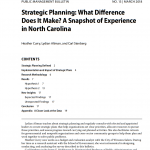Topic: Strategic Planning

Strategic Planning for Elected Officials: Setting Priorities, 2017
The term strategic planning describes a process through which people first agree on a desired future and then organize their resources and efforts toward meeting those long-term goals. A strategic plan defines what you want to accomplish for your organization or community and provides a road map for moving forward and staying on track. The authors, as trainers and facilitators, have helped communities of all sizes and varying characteristics work through strategic planning processes. This book is their way of offering those potential benefits to others.
Cite as:
Altman, L., Henderson, M. and Upshaw, V. (2017) “Strategic Planning for Elected Officials: Setting Priorities”
…
Continued
Strategic Planning: What Difference Does It Make? A Snapshot of Experience in North Carolina
This bulletin reports findings of a 2017 School of Government survey of all municipal
and county managers and elected officials in North Carolina to discern their views on the
importance of strategic planning and to determine what difference, if any, it has made in their
roles and relationships. Also included are quotes by local officials who agreed to follow-up
interviews.
Cite as:
Altman, L., Curry H., Stenberg, C.”Strategic Planning: What Difference Does It Make? A Snapshot of Experience in North Carolina.”
…
Continued
Creating Their Own Futures: Community Visioning and North Carolina Local Governments
This article addresses how elected and appointed local government leaders can help develop an authentic and comprehensive community vision to steer their communities during times of upheaval or relative calm. We discuss community visioning and strategic planning as tools that help communities understand current realities and trends, articulate desired conditions for the future, and develop and implement strategies for achieving those conditions. We begin by defining “community visioning,” its relationship to strategic planning, and the place of these ideas in a broader stream of collaborative governance concepts. Then, drawing on the experiences of three North Carolina communities, we outline general principles of successful community change, highlighting how they specifically relate to community visioning and strategic planning. Finally, we suggest some issues for local government leaders to bear in mind as they consider how their community might benefit from visioning.
Cite as:
Altman, L., S. More, R. “Creating Their Own Futures: Community Visioning and North Carolina Local Governments.”
…
Continued
